With the annual tax return deadline only a few weeks away, now is the perfect time to start preparing all your paperwork to avoid all that late-night uploading on 31st January! Using the tips in our handy guide, you can make a start right now. Then you can use the Christmas break to collate your receipts, claim all your allowances and submit your return, well before the deadline.
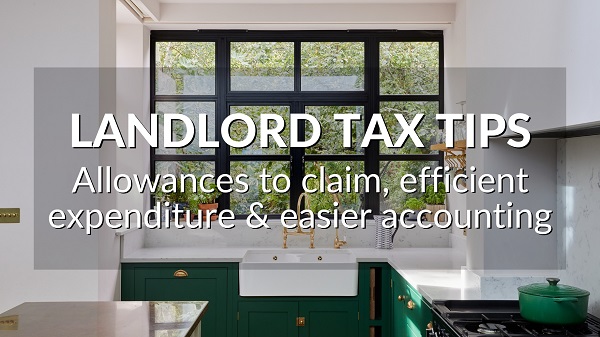
In addition, you’ll find top tips for streamlining your record keeping for the future, and ways to minimise your tax liabilities by caring for your buy-to-let and having a long-term plan. In short, all you need to get on top of your tax and feel relaxed, is right here.
BREAK UP THE TASK
Most of us leave our tax returns to the very last minute which means a slow build-up of anxiety that grows over the year until the deadline looms. Fortunately, it doesn’t have to be that way and there are some tools at your disposal to make the task feel smaller and more manageable.
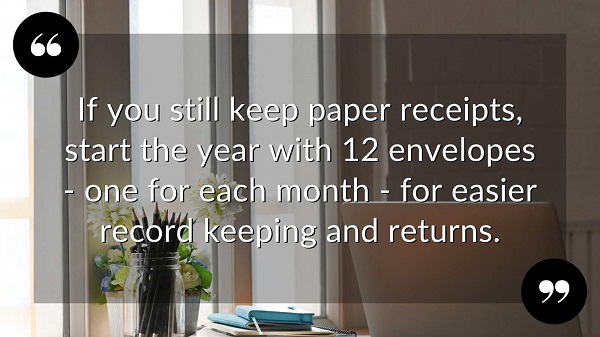
Envelopes
If you prefer a paper system, but you find the paper overwhelming, here’s a great trick: get 12 x A5 envelopes and label them from January to December. Drop in your receipts each month and write on the back what the purchase was for if it isn’t obvious on the front.
Apps
Online banking has come on in leaps and bounds, and many banks let you split your account into multiple areas. This means you can ‘tag’ your buy-to-let expenditure to make it easy to find when it comes to tax time. There are even apps for expenses where you can photograph your receipts, link them to payments and turn your paper trail into a digital one.
Accountants
If your portfolio is growing and your tax is getting more complicated, or you simply can’t stand paperwork and forms, you might want to consider employing an accountant to do your annual return. Just supply them with all your receipts and details of your income, then leave them to it. A good accountant will also make sure that you are taking full advantage of the tax rules so that you off-set as much as possible against your tax liability.
Managing agents
With a managing agent, you’ll have no receipts and paperwork at all. As well as organising the maintenance, repairs and legal compliance of your property, for a small annual fee they’ll send you a simple statement of your income and expenditure at the end of every tax year.
USE ALL YOUR ALLOWANCES
The best way to minimise your tax bill is to take advantage of every tax-deductible expense. There are more allowances than many landlords realise and they mount up to significant savings on your tax bill. Having a good managing agent on your side will help you claim everything you’re entitled to without having to do any research.
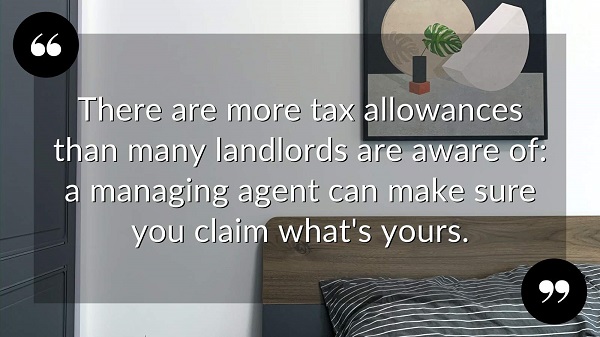
Among the allowances available to landlords are:
- Fees for letting and managing agents
- Costs for services like gardeners, window cleaners and house cleaners
- Accountancy fees
- Buildings and contents insurance
- Maintenance and repairs
- Gas, water and electricity bills
- Ground rent and service charges
- Council Tax when you have no tenant
- Legal fees including eviction costs
- Subscriptions to landlord associations
- Other direct costs of letting and managing your property including phone calls, travel and advertising
Are you making the most of these with your rental property? If you’re not sure about what you can claim for your property, get in touch and we’ll talk you through.
MAKE TAX-EFFICIENT REPAIRS
Unlike improvements, repairs and maintenance are still fully tax-deductible, which makes looking after your rental property a wise financial move. Not only can you claim back the costs, but you’ll also protect the value of your investment. Your tenants will appreciate you looking after them and their home and this means longer tenancies, fewer complaints and minimal void periods.
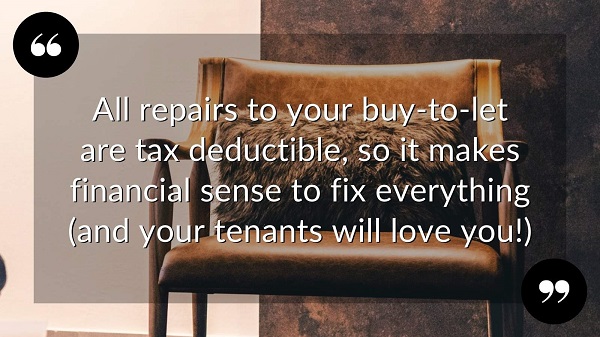
While you can’t usually claim for improvements, there are exceptions. For example, replacing a broken single-glazed window with a new double-glazed one is considered perfectly acceptable by HMRC and has the added bonus of improved energy efficiency.
If you’d like to talk about profitable repairs and maintenance at your rental property, give us a call on 01722 580059 or email info@piccoloproperty.co.uk
CONSIDER SETTING UP A COMPANY
If you own (or plan to own) more than one buy-to-let, or you’re already a higher rate taxpayer, it’s worth exploring whether holding your properties within a company would be right for you as there are certain tax advantages.

First, the rent you receive is not added to your personal income. Instead, it attracts corporation tax which currently stands at 19% (2021-2022) with no upper tiers (unlike Income Tax).
Secondly, you can claim back all the interest on your mortgage as a business expense - an advantage that grows with your portfolio.
Setting up a company is easy enough and can be done in about 15 minutes. Just be aware that mortgage lending is different with fewer lenders and slightly higher interest rates. It’s not the right option for everyone, so speak to a financial advisor with experience in this field to see what’s best for you.
HAVE A CAPITAL GAINS TAX PLAN
Capital Gains Tax can be a real downer on your business, particularly if you’re a higher rate taxpayer, with a large chunk coming off your profit when you sell your buy-to-let.

You can off-set some of this with your annual tax-free allowance (£12,300 for 2021-2022) and also if the property was your main home before or after you rented it out, but there is a much better strategy.
If you never sell your buy-to-let, you’ll never pay Capital Gains Tax on it, so it’s our advice to hold your property for the long term. In fact, plan to never sell.
Look for properties that will give you a lifetime of service, and then look after them. If you’d like to know the best types of property to rent out in the Salisbury and Wilton area, drop us a line at info@piccolorproperty.co.uk.
As values increase over time, you can use the capital in your property to continually expand your portfolio, or release funds for enjoying life, with zero Capital Gains Tax liability.
If you do decide to sell, remember that you can deduct the costs of improvements from your profit like extensions, loft conversions and modernising. You can also deduct the stamp duty you paid, as well as the fees of estate agents, surveyors and solicitors.
It’s also worth thinking about timing your sale as the capital gain will be added to your personal income for that year. So if you’re disposing of other assets like stocks and shares, or if your income is likely to fall (perhaps you’re about to retire) it could be worth holding off until the next tax year to reduce your bill.
Final words
Taking a proactive approach to your tax throughout the year will make the task of completing your return easier. You’ll also have the time and brain space to ensure you claim all the allowances available to landlords.
If you own a buy-to-let or have a rental property in the Salisbury or Wilton area, why not get in touch to see how we can make your life as a landlord simpler and more profitable. Pick up the phone to 01722 580059 or drop us a line at info@piccoloproperty.co.uk for a friendly chat and expert advice.




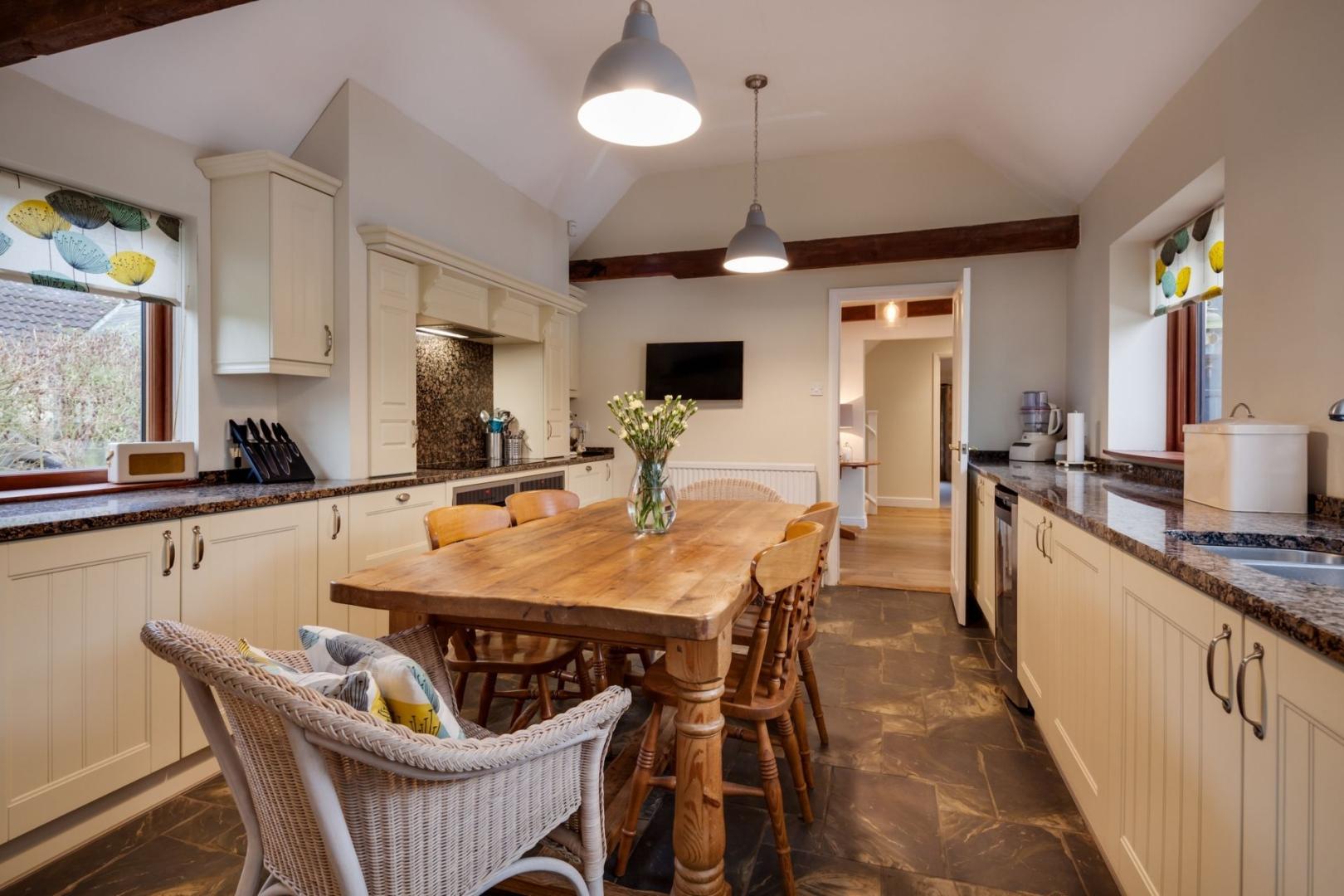

Share this with
Email
Facebook
Messenger
Twitter
Pinterest
LinkedIn
Copy this link